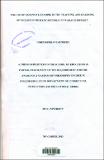| dc.description.abstract | The main purpose of this study was to investigate the use of extensive reading in the
teaching and learning of English in primary schools in Nyakach district. The study aimed
to achieve the following objectives: to establish the availability of extensive reading
resources in teaching and learning of English in primary schools in Nyakach district; to
examine how extensive reading is used in the teaching of English in primary schools in
Nyakach district; to establish how pupils are motivated into extensive reading; to find out
the challenges of using extensive reading in primary schools in Nyakach district. The
study was guided by Stephen Krashen's input hypothesis which states that use of
extensive reading offers language input to second language learning. A descriptive survey
research design was adopted. The study population included three thousand six hundred
and forty (3640) class 7 pupils and one hundred and forty-four (144) class 7 teachers of
English in primary schools in Nyakach district. The sample size comprised of forty-five
(45) teachers of English and three hundred and fifty-one (351) class 7 pupils. Simple
random sampling was used to select primary schools that participated in the study;
systematic sampling was then used to select class seven pupils who participated in the
study. Teachers of English who also teach class 7 were purposively selected and simple
random sampling was used to select a teacher from each participating school. The study
used questionnaires, interview schedule and observation schedule to collect data. The
instruments were pre-tested to establish their reliability and validity. The results were
analyzedusing descriptive statistics which were presented in percentages, pie charts, bar
graphsand tables. The study found out that most primary schools in Nyakach district do
not adequately use extensive reading in teaching and learning of English. Most primary
schoolsdo not have regular programs for extensive reading, consequently pupils do not
readextensively either at home or at school, the teachers do not explain to the pupils the
importance of extensive reading. Likewise most of the teachers do not use extensive
readingin teaching the four skills; most schools use individualized reading scheme with a
bias to silent reading. The study also established that pupils were not adequately
motivated to read extensively. In addition, primary schools face numerous challenges in
using extensive reading. These include: lack of extensive reading resources, heavy work
load, time constraint and attitude. In light of the findings the study recommended that
Ministry of Education should timetable library lessons; sensitize primary school teachers
on importance of extensive reading; school administration should establish libraries;
purchases more extensive reading materials; and develop a variety of extensive reading
materials. Parents should provide the pupils with extensive reading resources at home.
Pupils should be encouraged to read extensively and also be trained to plan their time so
that extensive reading is included in their schedule | en_US |

